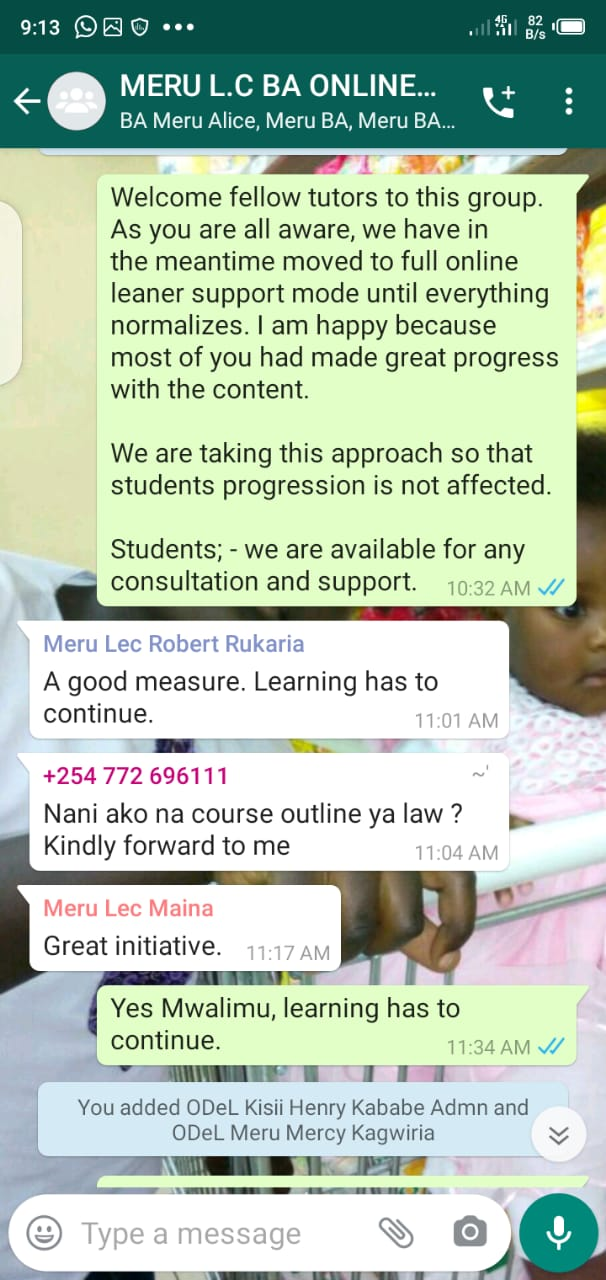Status of Learning at UoN during the Covid-19 Lockdown
The Corona Virus pandemic is a global phenomenon that has affected all sectors in every country in the world including higher education. Universities and colleges were forced to abruptly close and ongoing teaching of various courses was abandoned midstream. As a result, managers of universities and colleges with thousands of stranded students have been left wondering how to fill the gap and at the very least maintain some semblance of normality.
The University of Nairobi is not an exception and has had to find ways and means of adjusting by implementing its strategy of open, distance and e-learning. The University has a long history of distance learning that dates back to the 1960s. The long experience and the adoption of teaching and learning technologies overtime as they emerge has helped the university transition to online learning using its existing learning management system through its multimedia portal where digital content is hosted. Lecturers were also quick to keep contact with their students through social media such as whatsapp and teach using web conferencing tools such as Zoom, Google Meet, Hangouts and Class
The open, distance and elearning function of the University was revamped and relaunched in 2017. Its role was expanded and strengthened through Statute XXXVI, hence anchoring it by a structure that gave it the mandate to sensitize and create awareness in all programmes of the university, build capacity in courseware development and production, facilitate programme delivery and learner support and carry out research and evaluation of ODeL programmes and services. As a result of implementing this initiative, teaching staff have been trained to write study materials which have been converted and uploaded onto the University LMS and they have also produced videos of their lectures which are available in the LMS. During this period of COVID-19crisis, students enrolled in ODeL programmes have continued learning every day through the use of multi-media approach. It is expected that those students will sit for their exams as scheduled and continue with the subsequent semesters. Open, distance and e-learning allows learning and teaching to continue even difficult and special circumstances that conventional classroom based learning cannot allow. Over 10,000 students spread in over 25 programmes in the University have been going on with learning supported by over 400 tutors spread across the country,
The University has responded to the current crisis by tapping into its existing investment in ODeL. Immediately the closure took effect, the University embarked on a programme to train its staff and students to enable them move their teaching and learning to online platforms. The activities that have been ongoing to support this transition are:
1. Capacity Building for Faculty in use of eLearning Tools
The University trained the teaching staff in the use of both synchronous and asynchronous learning tools to connect with students during this period. The synchronous tools that faculty has been trained in include Google meet which is aimed at enabling faculty to interact with the learners in real time for limited tutorial sessions and/or supervision of postgraduate students. The asynchronous tools such as Google classroom and Moodle LMS will enable faculty to interact with learners at different times especially to access courseware and coursework.
2. Capacity Building for students in use of eLearning Tools
Students were trained on how to access and navigate the Learning Management System, and interact with the content and the tutors. The students were also introduced to the available synchronous and asynchronous learning tools such as google meet and google classroom and Moodle LMS. Recorded video clips developed and delivered by ODeL and ICT staff were made available to students with sessions on introduction to Google Meet, Google Classroom and on how to download and upload assignments on google class. These are available at http://eclass.uonbi.ac.ke/course/view.php?id=813
3. Tutorial and Learner Support for learners
Tutorial and learner support services for students are provided online by lecturers, administrative and technical staff.Learning Centre Coordinators located in Kisumu, Mombasa, Nairobi, Nyeri, Kisii, Meru, Eldoret, Bungoma, Kitale, Machakos and Isiolo have continued to support students from their regions with information, training on use of the online learning platforms, access to library resources and project supervision. Students in all courses that were ongoing before the lockdown have formed and operationalized WhatsApp groups to facilitate tutor-learner and learner-learner interactions. These have proved to be very effective in sharing of information, class notes, recorded videos, presentations, links to join online classes and training sessions as well as receiving feedback from students
Where links are shared through this medium, members are able to join through their smart phones or computers on time. Feedback given is addressed immediately as the technical and administrative support team is also part of the group. To ensure effectiveness, the ODeL Campus and ICT Centre worked together to train the tutors, administrative and technical support teams on the use of online platforms for videoconference teaching and meetings.
4. Courseware development and production
The ODeL Campus has continued to support faculty to develop and finalize courseware development. Courseware for select programmes is available on the LMS while faculty is being supported by ODeL instructional designers to develop more content for the LMS. A schedule to train lecturers has been developed to ensure that the modules that were in progress continue and new writers join the programme as per the annual plan. This schedule covers all the six colleges of the University. ODeL Instructional designers carry out pedagogical review of the completed modules and use online meetings to give feedback to the writers.
5. Thesis/Project/dissertation supervision
The University Senate approved a procedure for examining theses online. This will ensure that candidates who are ready are not delayed for graduation. The supervision of students will is continuing through the online platforms such as email and video conferencing platforms as has been the case. The most recent is three students from Bungoma and two based in Nairobi who presented their research proposals using Zoom.

